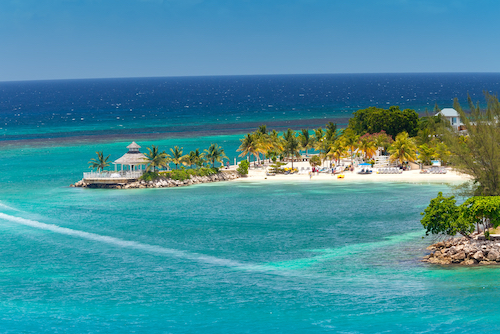Jamaica is developing as a market for expats seeking employment in a number of ways and is moving beyond the traditional employers of hospitality and tourism. After major challenges to the economy, the nation is now beginning to bounce back, with a number of new government initiatives designed to attract investors.The island’s service sector is still a major contributor to the country’s GDP, but mining (alumina and bauxite) are still significant, although the sector has declined somewhat. The music industry is also a major player, with a number of internationally recognized recording studios on the island. So if you are planning on seeking work here, you have some intriguing options to consider.
The Foreign Nationals and Commonwealth Citizens (Employment) Act seeks to ensure that qualified Jamaicans are given first consideration for employment vacancies. However, Jamaica does suffer from some skills shortages and thus also seeks to strike a balance between prioritizing local hire, and plugging any skills gaps.
You cannot work legally in Jamaica without a work permit, but you will need to have an offer of employment before you can apply for one via the Ministry of Labor and Social Security (MLSS). Note that if you are a Commonwealth citizen, you will be able to apply for a permit once you have arrived in the country. United States citizens, who are not Commonwealth citizens, need to ensure that they obtain a work permit before applying for work visas at either a Jamaican Embassy or Consulate.
The requirements means that your employer will do the bulk of the application for you, but you will still need to supply:
• a work permit application (you will need to fill out the first part of this and your employer must do the rest)
• a letter from your employer detailing the nature of the job and the reason why a Jamaican applicant could not be hired
• your CV/resume
• your qualifications (you will need to get any certificates or diplomas apostilled)
• an up to date police clearance check
• 2 photographs
• 2 copies of your passport
• a completed application for taxpayer registration in the form of a Tax Compliance Certificate
You will need to pay an application fee, the amount of which will depend on your profession: you can check this with the MLSS.

If you are self employed, you can apply for a work permit yourself via the MLSS. You will need the following documentation:
• the nature and duration of your work
• certified copies of your qualifications
• 2 x passport photographs
• your CV/resume
• an up to date police clearance record
You will need to pay a non-refundable processing fee of JMD$14,400 (US$109) but you will then need to pay for the permit itself (the cost of this depends on the duration of the permit).
You will also need an entrance visa in addition to a work permit: some countries have reciprocal visa arrangements with Jamaica and you will be permitted to stay on the island for a limited time before you need to formalize your arrangements.
If you have specialist qualifications and experience in the mining or music sectors, you might wish to consider Jamaica as an option. Tourism in Jamaica continues to be a booming area: the Tourism Minister has projected that the tourism sector will provide 41,000 new jobs on the island by 2022.
Construction is also expanding although the majority of jobs in this sector go to locals. If you have specialist skills in this sector, however, it is worth exploring the possibility of employment.
All 7 days of the week, including Sundays, are now considered to be working days. The working week is capped at 40 hours, and you can work up to 12 hours in a 24-hour period. You will be paid overtime if you work beyond these hours.
The minimum wage is JMD $7000 (US$52) for a 40-hour working week.

You will be entitled to sick pay, of up to 2 weeks: the amount will depend on how long you have been working for your employer. If you are pregnant, you will also be entitled to 12 weeks of maternity leave if you have been working with an employer for 1 year but will only be paid for 8 weeks of this.
Vacation leave is complicated and depends on the length of time that you have worked, but on average you will be entitled to 2 weeks’ leave per year.
Your spouse will not need a work permit if you are a Jamaican national, but if you are not they will not be able to work under your visa, but will require a separate permit. If you are a Commonwealth citizen, your dependents (over 18) will be entitled to apply for work permits on arriving in Jamaica.
Job Vacancies
Speculative applications to companies in Jamaica are common and you can also apply online through one of the many jobs boards or recruitment agencies.
You will find a number of major jobs websites, both for Jamaica (Jamaican Medium is a major player) and the Caribbean as a whole.
Applying For A Job
A standard one page CV/resume is acceptable.
Currently Jamaica has no law preventing discrimination against an individual on the basis of sexual orientation, gender identity, or gender expression. If you are a member of a sexual minority, you need to be aware that you may encounter discrimination in Jamaica: sexual contact between men is illegal, although a change in the legislation is pending and it is legal between women. Gender equality, however, has been improving.
Qualifications And Training
It is recommended that you get any copies of certificates and diplomas relating to your qualifications apostilled.
Would you like to share your experience of life abroad with other readers? Answer the questions here to be featured in an interview!

